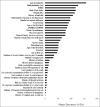Age at Natural Menopause; A Data Mining Approach (Data from the National Health and Nutrition Examination Survey 2013-2014)
- PMID: 37663399
- PMCID: PMC10472079
- DOI: 10.4103/ijpvm.IJPVM_647_20
Age at Natural Menopause; A Data Mining Approach (Data from the National Health and Nutrition Examination Survey 2013-2014)
Abstract
Background: The timing of the age at which menopause occurs varies among female populations. This variation is attributed to genetic and environmental factors. This study aims to investigate the determinants of early and late-onset menopause.
Methods: We used data from the National Health and Nutrition Examination Survey 2013-2014 for 762 naturally menopause women. Data on sociodemographic, lifestyle, examination, and laboratory characteristics were examined. We used random forest (RF), support vector machine (SVM), and logistic regression (LR) to identify important determinants of early and late-onset menopause. We compared the performance of models using sensitivity, specificity, Brier score, and area under the receiver operating characteristic (AUROC). The top determinants were assessed by using the best performing models, using the mean decease in Gini.
Results: Random forest outperformed LR and SVM with overall AUROC 99% for identifying related factors of early and late-onset menopause (Brier score: 0.051 for early and 0.005 for late-onset menopause). Vitamin B12 and age at menarche were strongly related to early menopause. Also, methylmalonic acid (MMA), vitamin D, body mass index (BMI) were among the top highly ranked factors contributing to early menopause. Features such as age at menarche, MMA, sex hormone-binding globulin (SHBG), BMI, vitamin B12 were the most important covariate for late-onset menopause.
Conclusions: Menarche age and BMI are among the important contributors of early and late-onset menopause. More research on the association between vitamin D, vitamin B12, SHBG, and menopause timing is required which will produce invaluable information for better prediction of menopause timing.
Keywords: Data mining; menopause; nutrition surveys.
Copyright: © 2021 International Journal of Preventive Medicine.
Conflict of interest statement
There are no conflicts of interest.
Figures
Similar articles
-
Artificial intelligence approaches to the determinants of women's vaginal dryness using general hospital data.J Obstet Gynaecol. 2022 Jul;42(5):1518-1523. doi: 10.1080/01443615.2021.2013785. Epub 2022 Jan 7. J Obstet Gynaecol. 2022. PMID: 35000545
-
Hypertension and age at onset of natural menopause in Korean postmenopausal women: Results from the Korea National Health and Nutrition Examination Survey (2008-2013).Maturitas. 2016 Aug;90:17-23. doi: 10.1016/j.maturitas.2016.04.019. Epub 2016 Apr 30. Maturitas. 2016. PMID: 27282789
-
The Association between Non-Alcoholic Fatty Liver Disease (NAFLD) and Advanced Fibrosis with Serological Vitamin B12 Markers: Results from the NHANES 1999-2004.Nutrients. 2022 Mar 14;14(6):1224. doi: 10.3390/nu14061224. Nutrients. 2022. PMID: 35334881 Free PMC article.
-
Machine Learning Models for Data-Driven Prediction of Diabetes by Lifestyle Type.Int J Environ Res Public Health. 2022 Nov 15;19(22):15027. doi: 10.3390/ijerph192215027. Int J Environ Res Public Health. 2022. PMID: 36429751 Free PMC article.
-
Genome-wide association studies of age at menarche and age at natural menopause.Mol Cell Endocrinol. 2014 Jan 25;382(1):767-779. doi: 10.1016/j.mce.2012.05.003. Epub 2012 May 14. Mol Cell Endocrinol. 2014. PMID: 22613007 Review.
References
-
- Research on the menopause in the 1990s. Report of a WHO Scientific Group. World Health Organization technical report series. 1996;866:1–107. - PubMed
-
- O’Connor KA, Holman DJ, Wood JW. Menstrual cycle variability and the perimenopause. Am J Hum Biol. 2001;13:465–78. - PubMed
-
- Cagnacci A, Pansini FS, Bacchi-Modena A, Giulini N, Mollica G, De Aloysio D, et al. Season of birth influences the timing of menopause. Hum Reprod. 2005;20:2190–3. - PubMed
-
- Pikwer M, Bergstrom U, Nilsson JA, Jacobsson L, Turesson C. Early menopause is an independent predictor of rheumatoid arthritis. Ann Rheum Dis. 2012;71:378–81. - PubMed
LinkOut - more resources
Full Text Sources
Miscellaneous


